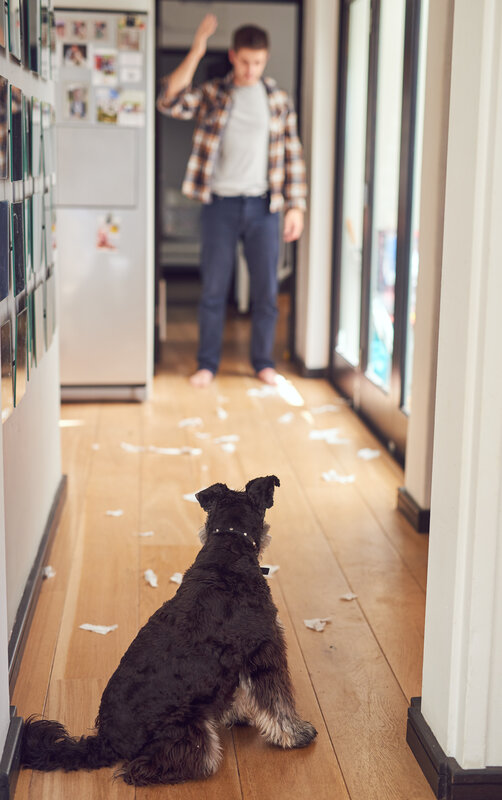
A stressed dog is an unhappy dog and can also become an unhealthy dog. Like humans, chronic stress or unmanaged anxiety puts dogs at risk for medical conditions, like digestion issues, skin problems, loss of appetite, or poor immune systems response.
And, as most human companions eventually realize, stressed or anxious dogs are more prone to destructive or unhealthy behaviors. Recognizing the signs your dog is stressed and getting to the bottom of their anxiety allows you to fix it, creating a more peaceful and happy home environment for all.
Here are some of the most common signs of a stressed dog, along with suggestions for supporting the situation. If your DIY doggy stress relief doesn’t work, we recommend consulting a professional dog trainer who can evaluate the dog and your home and provide personalized recommendations.
A dog who is well-behaved when owners are around but is destructive when left alone suffers from separation anxiety. Destructive behavior after learning otherwise is a major red flag for this common cause of dog stress. Dogs are programmed to live in a pack, offering constant companionship.
The pack also provides built-in playmates, exercise partners, and security. When left alone all day, your dog lacks all of the above. Our post about separation anxiety offers a series of tips, the most helpful of which are:
Sure, dogs may spend a bit chewing on their chew toys or trying to scratch and get comfortable in their sleeping spot. However, any excessive behaviors are a sign of stress or anxiety in a dog.
Excessive growling or aggressive barking are signs of nervous aggression and are a top priority. However, incessant barking or howling is also a sign a dog is nervous to the point of chronic anxiety. Don’t take these behaviors lightly. Instead, try to get to the bottom of them.
Some dogs respond well to having music or TV on when left alone for a while; others simply need more socialization - on walks and dog park outings - to become familiar with strangers and other dogs. Extra exercise is almost always a place to start. If you don’t have the time, hire a professional dog walker to help your dog release pent-up energy that leads to stress or anxiety.
House-trained dogs should rarely urinate or defecate in a home once the training is complete. A house-trained dog that begins urinating or defecating may be sending stress messages. The first step is a visit to the veterinarian to rule out any possible medical conditions such as a urinary tract infection or a digestive issue.
If your dog gets the all-clear from the vet, it’s time to repeat potty training while simultaneously working to address the cause of stress (lack of exercise, being home alone too much, outside triggers like a particular noise, passersby or it has to do with a relationship between the owner and dog that is out of balance.) A professional dog trainer can help you if this is the case. You should also revisit potty training basics to ensure you aren’t missing your dog’s physical cues or signs. Step one is to return to a stringent potty schedule using a crate or close contact to keep the dog from getting to other areas of the house). You may also add or consider bell training for potty training, which ensures a clear “cue” for your dog to communicate to you when s/he needs out. Doggy doors may be a help where they are allowed and appropriate (leading to a securely enclosed area).
All the while, pay close attention to your dog’s body language when you’re together. They may not be able to communicate using words, but they signal their distress loud and clear. By learning more about their physical cues you’ll learn the source of their anxiety.
Other physical signs of a stressed dog include:
Body language is a powerful communicator, especially in the canine kingdom. Odds are there are minor (to you) signs your dog is stressed (shaking, low whining/growling, panting, agitation). These physical cues show up long before some of the more major behavior issues appear.
We recommend learning all you can about dog body language, or working with a trainer to interpret your dog’s cues and get to the heart of what makes him/her stressed or anxious.
Need insight into what’s making your dog so stressed out, anxious, nervous, or aggressive? Schedule a consultation with Alternative Canine Training, at (734) 462-2810. Our team of experienced, certified dog trainers can work with you in your home, in a group training class, or in doggy boot camp.